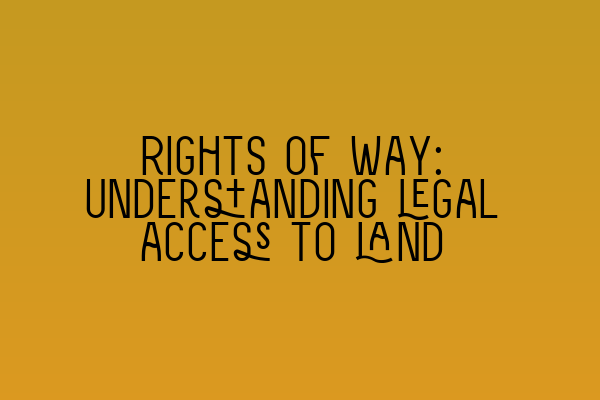Rights of Way: Understanding Legal Access to Land
When it comes to property ownership, having legal access to your land is of utmost importance. One key aspect of this is understanding the rights of way. In this article, we will delve into the intricacies of rights of way, exploring what they are, how they are established, and the implications they have on land ownership.
What Are Rights of Way?
Rights of way refer to the legal rights that allow individuals to pass through or use a specific piece of land owned by another person. These rights are typically granted by the owner of the land and can be permanent or temporary.
There are two main types of rights of way:
- Public Rights of Way: These are created by law and granted to the public for recreational purposes, such as footpaths, bridleways, or byways. Public rights of way are typically marked by signage or indicated on maps and can be accessed by anyone, as long as they use the designated route.
- Private Rights of Way: These are rights granted to specific individuals or properties for accessing their land. Private rights of way can be established through various means, including express permission, implied permission, or by long use or custom.
Establishing Rights of Way
There are different ways in which rights of way can be established.
1. Express Permission: Rights of way can be expressly granted by a landowner through a legal document, such as a deed or easement. This document will specify the route and duration of the right of way.
2. Implied Permission: In some cases, rights of way may be implied from the circumstances, such as historical use or necessity. For example, if a property has been accessed through a specific path for many years without any objection from the landowner, an implied right of way may be established.
3. Prescription: A right of way can also be established through long use or custom. This is known as a prescriptive right of way. To prove a prescriptive right of way, the user must demonstrate that the usage has been continuous, uninterrupted, without force, and for a specific period of time (typically 20 years).
Implications of Rights of Way
Having a right of way on your land or using a right of way that crosses another person’s property can have various implications.
1. Land Value: Properties with established rights of way may have higher values, especially if the right of way provides convenient access to amenities, public transportation, or scenic areas.
2. Maintenance Responsibilities: The responsibilities for maintaining a right of way can differ depending on the type of right of way and the agreements made. In some cases, the landowner may be responsible for the upkeep, while in others, the user may have to contribute to the maintenance costs.
3. Use Restrictions: Rights of way may come with specific use restrictions. For example, a right of way may only allow pedestrian access and prohibit motorized vehicles. It is essential to understand any limitations associated with the right of way to avoid potential disputes.
Resolving Disputes
Disputes related to rights of way can arise for various reasons, such as disagreements over the extent of the right of way, improper use, or obstruction. If you find yourself in a rights of way dispute, it is advisable to seek legal advice from a property law professional.
At SQE Property Law & Land Law, we have a team of experienced solicitors who specialize in property law matters, including rights of way. We can provide you with expert guidance and representation to protect your rights and interests.
If you need further assistance with SQE exam preparations, we also offer SQE 1 and SQE 2 preparation courses, practice exam questions, and mock exams. Check out our SQE 1 Practice Exam Questions and SQE 1 Practice Mocks FLK1 FLK2 articles to enhance your exam preparations.
Conclusion
In conclusion, understanding the rights of way is crucial for property owners and individuals who need access to specific land. Whether it’s a public right of way or a private right of way, knowing how these rights are established and their implications on land ownership is essential.
If you have any questions or concerns regarding rights of way or any other property law matters, our team at SQE Property Law & Land Law is here to help. Contact us today for expert legal advice and support.
